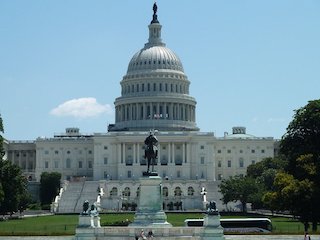U.S. regulators are exploring requiring Big Tech companies to pay more for the internet service they rely on to make billions of dollars. Proponents believe that money could prop up local economies and help close the digital divide.
The Senate Commerce Committee on Wednesday passed onto the full Senate bipartisan legislation that directs the FCC to study the feasibility of collecting fees from companies like YouTube, Google and Netflix to shore up the agency’s broadband deployment subsidy reserve, the Universal Service Fund (USF). Senators Shelley Moore Capito (R-WV), Committee Ranking Member Roger Wicker (R-MS), Todd Young (R-IN) and Communications Subcommittee Chair Ben Ray Luján (D-NM) sponsored the Funding Affordable Internet with Reliable Contributions Act or the FAIR Contributions Act.
The USF is funded by an assessment on telecommunications provider revenue from long-distance voice service. This revenue has been decreasing for over 15 years while the contributions factor, or the percentage assessment that gets passed onto customers, has been rising over that same time period. It went from just over 11 percent in 2007 to over 23 percent today, according to The WTA – Advocates for Rural Broadband.
“It makes no sense to be assessing long-distance voice revenue to fund what is now a broadband-focused fund,” said WTA SVP Government & Industry Affairs Derrick Owens. “One of the proposed solutions is to assess large companies that are making a lot of money off of the availability of a ubiquitous broadband network. This would be a way to shift the burden of supporting the priorities of USF from customers to edge providers. We support the FCC studying this issue to better understand the feasibility of this idea and the effects this action could have on the stability of USF.”
The Competitive Carriers Association said Wednesday: “Many competitive carriers, as well as low-income consumers, schools and libraries, and rural Americans, rely on USF support, and sustainable USF contributions will help achieve important Universal Service goals. CCA supports the progression of the legislation and looks forward to continued work with the sponsors as it is considered by the Senate.”
Not everyone is a fan. “Consumers currently pay internet access fees and companies that use extra bandwidth for everything from search to video streaming already pay extra fees to internet access providers,” said Matt Schruers, president of the Computer and Communications Industry Association, which represents Big Tech companies. “These digital services help create the demand for the services internet access providers are selling,” he told Axios.
The USF provides support to high-cost areas, schools and libraries, rural health care facilities, and Lifeline, an FCC program that provides a discount on phone service for low-income consumers. According to the bill text, the report must consider (1) the type and size of firms and services on which contributions could be assessed, (2) equity issues related to current versus alternative systems for contributing to the fund, (3) the effect of any change to the contribution system on the telecommunications bills of consumers, and (4) the sustainability of the fund and how to ensure that fund disbursements are consistent and predictable over time.
By Leslie Stimson, Inside Towers Washington Bureau Chief





Reader Interactions